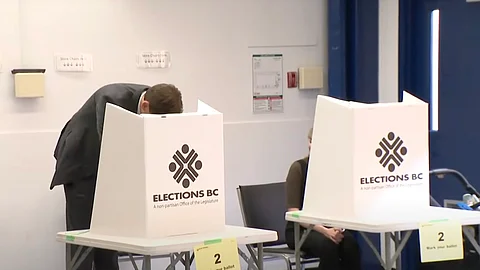

It has been revealed that unions outspent other third-party advertisers in the lead up to the 2024 British Columbia election.
Despite changes to the rules preventing such groups from advertising on behalf of particular candidates or parties, they seem to have still managed to get their message to the people.
While some opted to focus on simply promoting their particular cause, others directly attacked the BC Conservatives, accusing the party of threatening whatever it was they were supporting.
According to 2024 general election financing report data released by Elections BC on Tuesday, three of the top five highest spending third-party advertisers were unions or groups that advocate for their rights.
By far and away the biggest spender was the Hospital Employees' Union, which dropped $470,401.
Under BC campaign regulations, in the 60 days before the writ is dropped, third-party advertisers have no spending limits, but they must disclose their donors, affiliations, and how they spent the money. Between writ drop on September 21 and election day on October 19, all the same disclosure rules apply, plus a spending limit.
The HEU spent the vast majority of its funds, $460,124, during the pre-campaign advertising period. That included $180,619 on television and video advertisements, $154,453 on radio and podcast advertisements, and $125,051 on social media advertisements.
During the campaign period, only $10,276 was spent, all on social media advertising.
Its ads on Facebook were highly critical of the BC Conservatives and leader John Rustad, calling him and his plans "devastative for health care workers and patients across the province."
The third highest spenders, after the Downtown Vancouver Business Improvement Association, was the National Police Federation, which bills itself as a provider of "strong, fair, and progressive representation to almost 20,000 RCMP Members across Canada."
The NPF spent $152,668, all during the campaign period. Of that, $54,022 was spent on social media advertisements, $45,150 on commercial canvassing, $20,283 on non-social media online advertisements, $17,368 on printed newspaper advertisements, and $15,844 on website maintenance and graphic design.
Next up was the Canadian Labour Congress, which spent $100,000 exclusively on social media advertisements during the campaign period.
On the opposite end of the spectrum were conservative-leaning groups such as West Coast Proud, which spent $16,903 on social media and other online advertisements in both the pre-campaign and campaign periods.
While more than 200 entities registered as third-party advertisers, WCP was singled out and scrutinized by many on the left. Their online success drew the ire of left-wing outlet The Tyee, which in conjunction with the Investigative Journalism Foundation attempted to cast doubt on their legitimacy by painting them as "secretive."
"One thing that we find that happens consistently," Modern Miracle Network founder Michael Binnion told the Western Standard, "is somehow, because it's a pro-conservative group, it should disclose everything about its private affairs, even though other organizations that are not conservative supporting don't."
Binnion summarized the left's argument as, "Yes, unions and all these other groups are spending way more money, but that's okay, because, they're transparent and ethical, whereas these guys who spend very little money are somehow not transparent and not ethical."
WCP Director Andy Crooks described The Tyee's use of particular terms such as "secretive" as "dog whistles," and argued that the left "feel[s] threatened because there's no moral, ethical or political foundation for their policies or governance habits."
